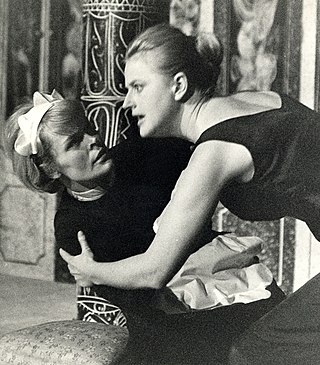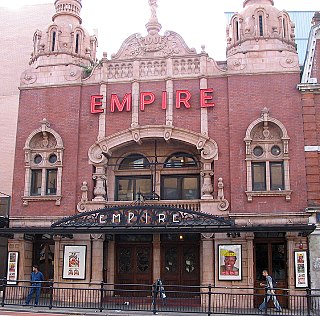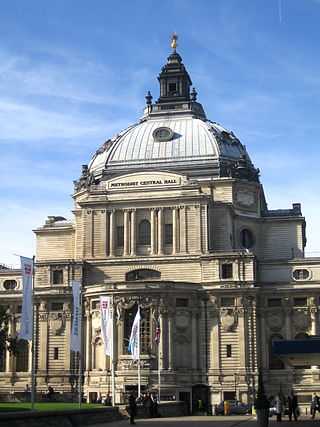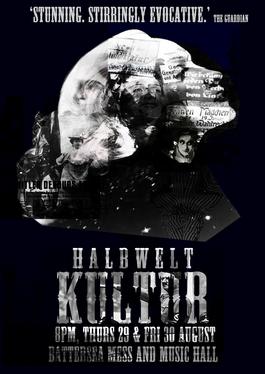
Titus Andronicus is a tragedy by William Shakespeare, believed to have been written between 1588 and 1593. It is thought to be Shakespeare's first tragedy and is often seen as his attempt to emulate the violent and bloody revenge plays of his contemporaries, which were extremely popular with audiences throughout the 16th century.

Notting Hill is a district of West London, England, in the Royal Borough of Kensington and Chelsea. Notting Hill is known for being a cosmopolitan and multicultural neighbourhood, hosting the annual Notting Hill Carnival and the Portobello Road Market. From around 1870, Notting Hill had an association with artists.

Simon Phillip Hugh Callow is an English actor. Known as a character actor on stage and screen, he has received numerous accolades including an Olivier Award and Screen Actors Guild Award as well as nominations for two BAFTA Awards. He was made a Commander of the Order of the British Empire (CBE) for his services to acting by Queen Elizabeth II in 1999.
Drag is a performance of exaggerated femininity, masculinity, or other forms of gender expression, usually for entertainment purposes. Drag usually involves cross-dressing. A drag queen is someone who performs femininely and a drag king is someone who performs masculinely. Performances often involve comedy, social satire, and at times political commentary. The term may be used as a noun as in the expression in drag or as an adjective as in drag show.
A political drama can describe a play, film or TV program that has a political component, whether reflecting the author's political opinion, or describing a politician or series of political events.

The Maids is a 1947 play by the French dramatist Jean Genet. It was first performed at the Théâtre de l'Athénée in Paris in a production that opened on 17 April 1947, which Louis Jouvet directed.
Sir Matthew Christopher Bourne is a British choreographer. His productions contain many classic cinema and popular culture references and draw thematic inspiration from musicals, film noir and popular culture

Mark Ravenhill is an English playwright, actor and journalist.
Neil Vivian Bartlett, OBE, is a British director, performer, translator and writer. He was one of the founding members of Gloria, a production company established in 1988 to produce his work along with that of Nicolas Bloomfield, Leah Hausman and Simon Mellor.
The Shakespeare Theatre Company is a regional theatre company located in Washington, D.C. The theatre company focuses primarily on plays from the Shakespeare canon, but its seasons include works by other classic playwrights such as Euripides, Ibsen, Wilde, Shaw, Schiller, Coward and Tennessee Williams. The company manages and performs in two spaces: The Michael R. Klein Theatre and Sidney Harman Hall. In cooperation with George Washington University, they run the STC Academy.

Hackney Empire is a theatre on Mare Street, in Hackney in the London Borough of Hackney. Originally designed by Frank Matcham it was built in 1901 as a music hall, and expanded in 2001. Described by The Guardian as "the most beautiful theatre in London" it is an Arts Council England National Portfolio Organisation.
Shopping and Fucking is a 1996 play by British playwright Mark Ravenhill. It was Ravenhill's first full-length play. It received its first public reading at the Finborough Theatre, London, in 1995. It was performed in 1996 at the Royal Court Upstairs, before embarking on a national and international tour, co-produced by Out of Joint and the Royal Court Theatre.

Tim Fountain is a British writer.

Jonny Woo is a British comedian, actor, and drag queen. He co-owns The Glory: an East London pub where he regularly performs.

On 9 September 1971 the UK Gay Liberation Front (GLF) undertook an action to disrupt the launch of the Church-based morality campaign Nationwide Festival of Light at the Methodist Central Hall, Westminster. A number of well-known British figures were involved in the disrupted rally, and the action involved the use of "radical drag" drawing on the Stonewall riots and subsequent GLF actions in the US. Peter Tatchell, gay human rights campaigner, was involved in the action which was one of a series which influenced the development of gay activism in the UK, received media attention at the time, and is still discussed by some of those involved.
The Madness of Lady Bright is a short play by Lanford Wilson, among the earliest of the gay theatre movement. The play was first performed at Joe Cino's Caffe Cino in May 1964.

Halbwelt Kultur is a 2012 musical cabaret based on the lives of seven highly influential women of the Weimar Republic.
Split Britches is an American performance troupe, which has been producing work internationally since 1980. Academic Sue Ellen Case says "their work has defined the issues and terms of academic writing on lesbian theater, butch-femme role playing, feminist mimesis, and the spectacle of desire". In New York City Split Britches have long standing relationships with La Mama Experimental Theatre Company, where they are a resident company, Wow Café, which Weaver and Shaw co-founded, and Dixon Place.
Peggy Shaw is an actor, writer, and producer living in New York City. She is a founding member of the Split Britches and WOW Cafe Theatre, and is a recipient of several Obie Awards, including two for Best Actress for her performances in Dress Suits to Hire in 1988 and Menopausal Gentleman in 1999.
Hot Peaches was a drag theatre company in New York City that would put on one play a week, active from the 1970s-1990s. Hot Peaches was founded by Jimmy Camicia in 1972, who encountered a group of drag queens and began writing work for them to perform. Their work has been described as "political camp, dominated by drag".











